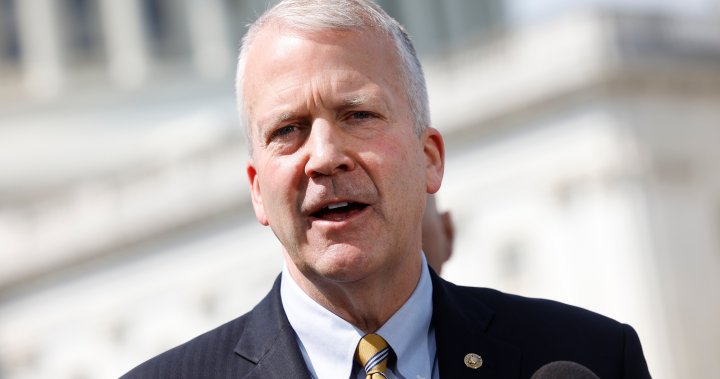A senior U.S. military official in line to become the head of NORAD committed Wednesday to having “tough conversations” with Canada about defence spending.
Lt.-Gen. Gregory Guillot, U.S. President Joe Biden’s pick to run the North American Aerospace Defence Command (NORAD), vowed to do so when questioned by Alaska Sen. Dan Sullivan during a meeting to confirm his nomination.
Sullivan, a Republican, grilled Canadian defence spending as “incredibly disappointing,” and said “Americans get frustrated when our allies don’t pull their weight.”
“I hope the Canadians are watching your confirmation hearing.… Can you commit to this committee that you can have discussions with the Canadians and say, ‘Hey look, when you’re not supporting NATO, when you’re not supporting missile defence for North America, it’s actually harmful to the alliance’?” Sullivan asked.

“Yes, senator. You can count on me to do that,” Guillot replied.
Prime Minister Justin Trudeau defended his government’s defence contributions when asked about Sullivan’s comments Thursday in Newfoundland.
“We’ve invested massively in NORAD modernization just earlier this year, and we’re continuing to step up in our NATO commitments,” he said.
“We continue to engage around the world, even as we continue to procure the kinds of equipment that the Canadian Armed Forces are going to need to continue to do their work.… We’re going to continue to step up in this time of increased concerns around security everywhere around the world.”
The grilling came a day after Trudeau named Bill Blair to run the Department of National Defence and the Canadian Armed Forces (CAF) during a cabinet shuffle.
Up until Wednesday, Oakville MP Anita Anand held the post, which has dominated with the war in Ukraine and cultural reform in the military.

Anand’s move has already raised eyebrows among defence watchers, who have questioned what it means for the Liberals’ commitment to reforming the ranks.
Blair, who previously served as emergency preparedness minister and was chief of Toronto police before entering politics, is not particularly known for his communications acumen or stickhandling largescale reform.
Those issues aside, Canada has been under pressure from NATO allies to dramatically ramp up defence spending to two per cent of GDP – a NATO target. Canada has agreed to that target but has not set out a plan to reach it, with current spending sitting just shy of 1.3 per cent.
Trudeau and Anand routinely shrugged off suggestions Canada is not pulling its weight in NATO and have argued that Canadians are going above and beyond to help Ukraine.

Canada’s commitment to security ‘ironclad’: official
In regard to NORAD, Ottawa has pledged around $40 billion to modernize the U.S.-Canada continental defence organization, along with billions on purchasing F-35 fighter jets and building new naval ships.
During Wednesday’s hearing, Guillot raised the significance of defence in the Arctic, saying “almost any avenue of approach to the homeland comes over the Arctic.”
Sullivan once again called out Canadian defence spending, saying “they’re not very good at paying for missile defence either, even though we protect the whole North American continent.”
Daniel Minden, acting director of communications for the national defence minister, told Global News in a statement Thursday that Canada’s commitment to “Euro-Atlantic and global security is ironclad – and we continue to make landmark investments to equip our Armed Forces.”
He cited Trudeau’s recent commitments to NATO at its summit earlier this month as an example of Canada’s defence contributions.
Trudeau announced the CAF will welcome Ukrainian officer cadets for an intensive training program, developed in partnership with NATO, at the Royal Military College in Saint-Jean-sur-Richelieu, Que. He also said the government will spend $2.6 billion over three years to add 2,200 troops in Latvia, where a Canadian-led NATO battle group hopes to become a brigade.

“To increase CAF readiness, resilience and relevance, we are currently undertaking a review of our defence policy,” Minden said.
“We will continue to invest in the Canadian Armed Forces and deliver modern equipment to our military, which is renowned around the world for its excellence and professionalism.”
‘Bad mistake’ to judge defence commitment solely on spending
In April, U.S. Ambassador to Canada David Cohen told a crowd of past and present U.S. ambassadors, trade lawyers and bilateral scholars that it’s an all-too-common “bad mistake” to judge Canada’s commitment to global military security solely on defence spending.
“I think it would be a bad mistake — and I frankly think that too many people are making this mistake that somehow we need to assess Canada’s commitment to defence by one metric,” he said.
“I don’t think that’s right.”

Cohen suggested Canada’s support of Ukraine in its war against Russia and its plans to fortify Arctic defence should carry more weight in the policy debate than they currently do.
“Forget about the percentage of Canada’s defence spend as compared to GDP. Canada has stepped up at every opportunity, whenever requested by the United States or by the UN, to provide military support to Ukraine,” he said.
“Every time there’s been a need, Canada stepped up.”

Minden said that to date, Canada has committed more than $1.5 billion in military aid to Ukraine, and more than $8 billion in total aid to the country.
“In the Joe Biden view of the world, no country should be judged or assessed out there on their own for what they’re doing in the defence space,” Cohen said.
“The question is: what kind of a partner are you? We think of Canada and the United States as inextricably intertwined.”
— with files from Global News’ Alex Boutilier and The Canadian Press




